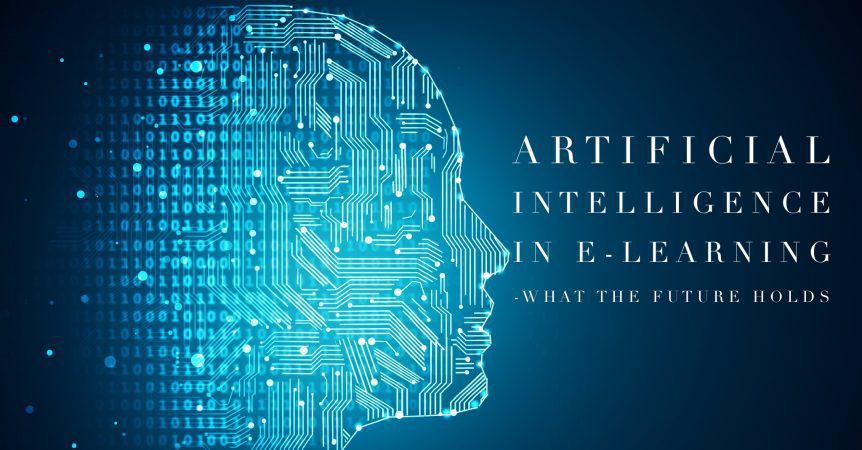Artificial Intelligence in E-Learning – What the Future Holds
Artificial Intelligence (AI) is a technology that will increasingly impact our lives in the future. In fact, it is already here today. The autonomous vehicles that car manufacturers are currently testing in locations around the world use AI, for example. There are also chatbots on Facebook with basic AI engines, plus personal assistants like Amazon Alexa also use AI.
How will AI impact training and e-learning, however? Here are some of the things we should expect.
Content Will Automatically Customise
One of the things e-learning design professionals do now is personalise and customise content for learners as much as possible. Customising means making the content as directly relevant to the learner’s job role, level of knowledge, and day-to-day experience as possible.
Personalising e-learning involves passing some control over how the learner progresses through the course to the learner. In other words, instead of having pre-determined linear learning pathways, you let the learner make decisions on the direction of the path they take.
AI will automate this process. In other words, AI will be able to determine a learner’s knowledge of a new concept or skill and it will then create a constantly evolving learning pathway for that learner to take.
Virtual Tutors Will Help Students on a One-on-One Basis
It is already possible to include chatbots in e-learning courses as an interactive tool for learners. AI will supercharge these chatbots, turning them into one-on-one virtual tutors.
This means learners will be able to ask questions, seek clarification, and get help when they need it, without the need for a real-life trainer or mentor to be involved.
What still needs to be determined, of course, is how learners will respond to virtual trainers. Will the increased distance this puts between the trainer and the learner reduce the effectiveness of the course?
In addition, it’s easy to see how a virtual tutor built using AI could reduce the cost of producing and delivering an e-learning course, particularly to a dispersed group of learners. Will the trade-off be poorer quality results, however?
Enables Further Improvement in Engagement Levels
Engagement is one of the key challenges of delivering any sort of training. Without it, you are just going through the motions. The aim is to improve engagement, something which e-learning already does.
Here are just some of the things that are possible with e-learning which improve learner engagement:
- Interactivity features like avatars and gamification elements
- Media like video and infographics
- Learning techniques like spaced repetition and scenarios
- Technical and design tools including mobile learning and instructional design
While e-learning courses already achieve high levels of engagement compared to other methods of learning and training, AI will enhance this further. It will do this by creating learning experiences for the learner that are completely immersive.
This will be very different to simply taking a course, doing a lesson, or completing a module. Instead, the learner will feel like you have created the courses specifically for them, even though they might be one of the thousands of people doing the course in several different countries and regions.
Improvements in Data Analysis
Data analysis is already an area where AI is making enormous strides.
Medicine is one of the most significant examples. This is because AI software can consume greater amounts of medical data than leading consultants can. It can also consume this information and make sense of it quicker than a consultant, making it possible for AI software to diagnose medical conditions faster and with greater accuracy than a trained and experienced medical professional.
AI data analysis tools will probably improve e-learning courses too. For example, AI software in the future could potentially create content for the course with minimal human involvement. You could also get deeper and more meaningful reports about the effectiveness of a course and the results you achieve. You can then use this – or the AI software can use it – to create better courses in the future.
AI Will Create Business Opportunities
As mentioned above, AI has the potential to cut the costs of delivering training with technologies like virtual tutors. This is because it could potentially reduce the level of resources required to train members of your team and others. Of course, this is already one of the great benefits of e-learning. Adding AI to e-learning is likely to enhance this benefit.
In addition to reducing the cost of in-house training while also making that training more efficient, e-learning could also create new business opportunities. For example, could AI, e-learning, and just-in-time learning techniques make user manuals a thing of the past? Could some of the future technical capabilities of e-learning lead to new products you could sell? Could you enhance the service you deliver to customers with AI-charged e-learning courses?
What Will the Future of Training Look Like?
Of course, there is no definitive answer to this question. The reality is it is impossible to know what training and e-learning will look like with the introduction of technologies like AI. Plus, while it is relatively easy to see where the technology is going, it is much more difficult to understand how individuals will respond to these technologies.
That said, the potential of AI and the potential benefits do look exciting. Watch this space.
